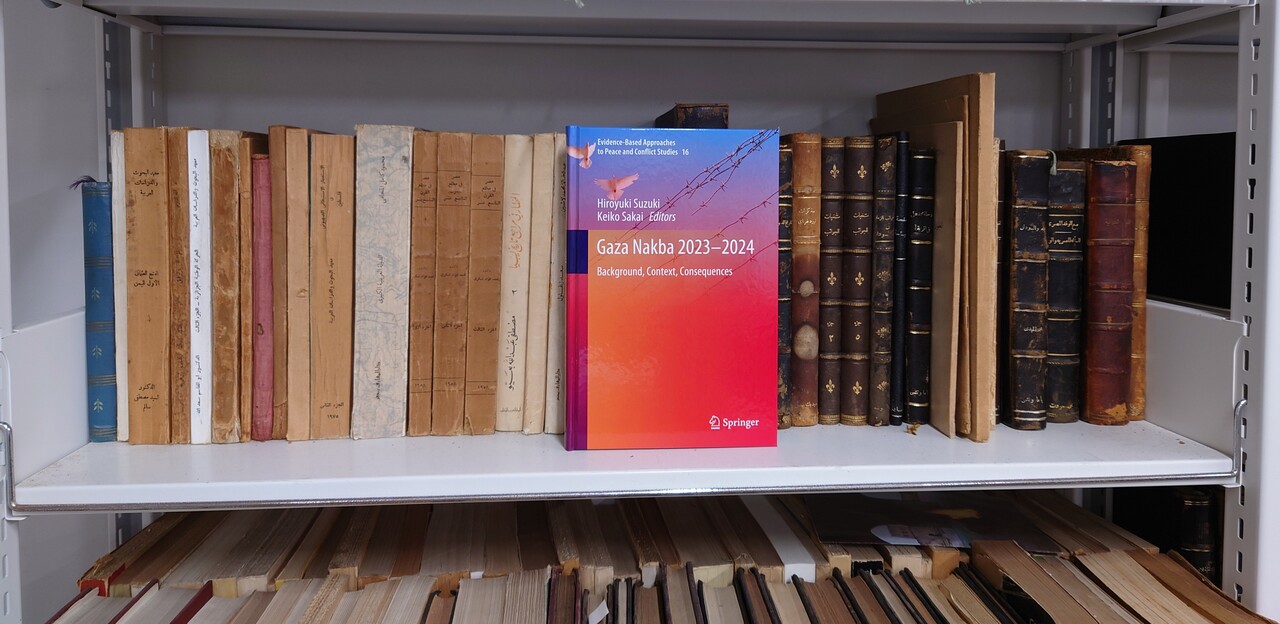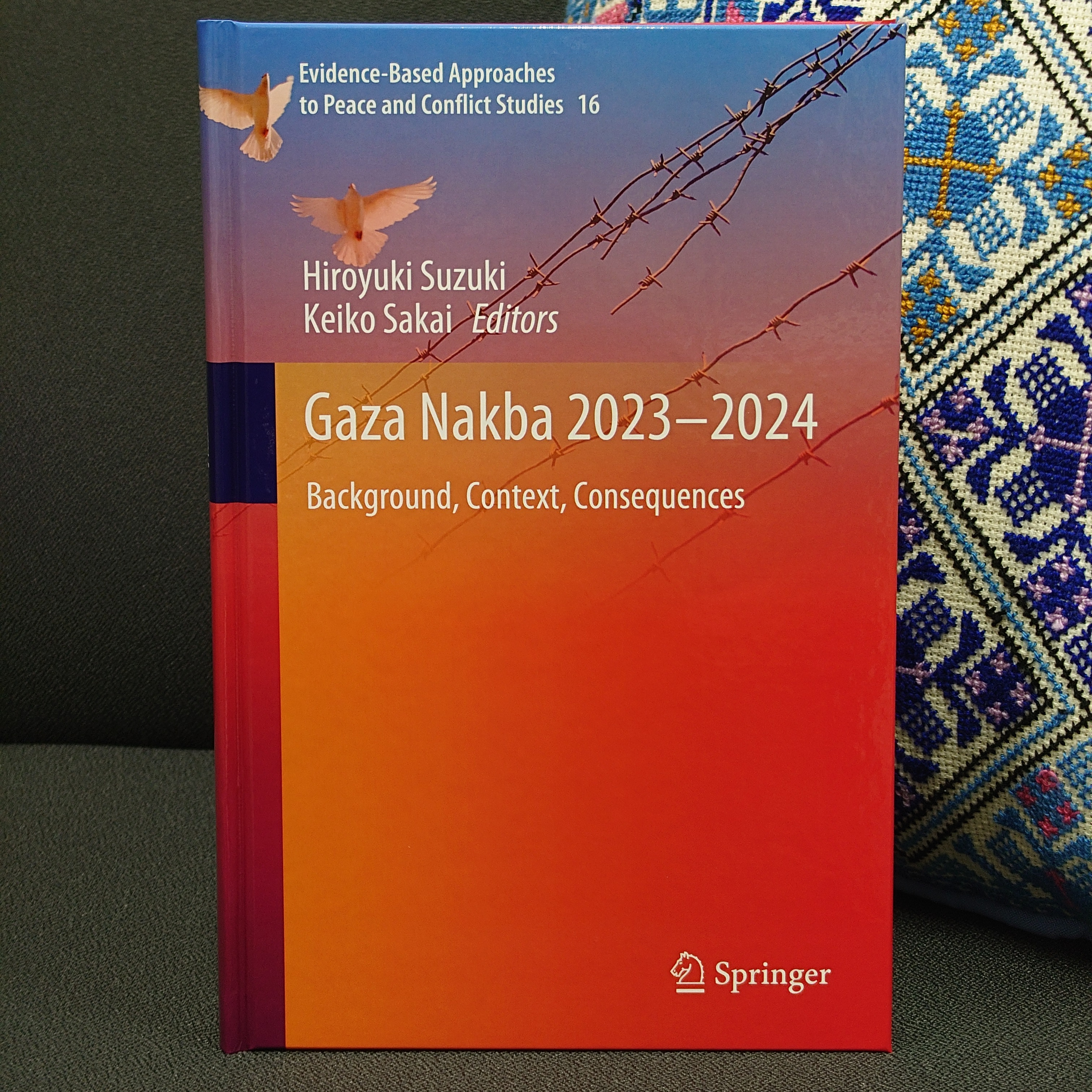Gaza Nakba 2023–2024: Background, Context, Consequences
Published in Sustainability and Law, Politics & International Studies

Juno Kawakami, responsible editor for the book Gaza Nakba 2023–2024: Background, Context, Consequences (https://link.springer.com/book/10.1007/978-981-97-4868-6) interviewed the volume editors, Hiroyuki Suzuki and Keiko Sakai, about topics related to their book.
What distinguishes this book from other publications on Palestine and Gaza?
This book emerged from a public symposium held at the University of Tokyo on November 16, 2023, convened to address the escalating humanitarian crisis in Gaza. At that time, the humanitarian crisis in the Gaza Strip had already deteriorated to unprecedented levels. The symposium examined the history of the Israeli-Palestinian conflict, the background of the Gaza blockade and its impact on Gaza society, as well as the perspective of Israel’s security, the origins of Hamas, and the legal implications regarding Israel’s military operations in Gaza under international law.
Although several books on Gaza were being published in Japanese, we chose to edit an English edition to contribute to the global discourse. Unfortunately, the importance of speaking about Gaza has grown even more due to the worsening situation. This book represents one of many necessary efforts to foster international understanding and dialogue.
The war is still on-going. What made you decide to publish the book in early 2025?
We must understand that the war on Gaza has been unusually long and fierce. When we began writing and editing this volume, we hoped the war would have ended by the time of publication. In Japan alone, nearly 20 new books dedicated to narrating the story over Gaza have been published over the past two years. The humanitarian crisis in Gaza has the potential to be regarded as one the greatest tragedies of the 21st century, and as a result, terms such as settler colonialism, Nakba, military occupation, and Zionism have become more widely used not only in academic circles but also in civil society in Japan.
Professor Sakai is an Iraq specialist and Professor Suzuki is a Palestine/Israel specialist. Why did you decide to collaborate on this book project?
Japanese scholars have long engaged in comparative research through collaborative projects with Middle Eastern scholars. Exchange between individual scholars has been ongoing for more than half a century, not only through academic organizations such as the Japan Association for Middle East Studies, the Association Islamic Studies in Japan, and the Society for Near Eastern Studies in Japan, but also through research grant programs. Professor Keiko Sakai has an extensive record of leading comparative research and has served as editor-in-chief for numerous academic series in Japan. It was only natural that a publishing project with Springer was initiated under her leadership. Meanwhile, I, Hiroyuki Suzuki, was increasingly called upon to provide expert analysis on television and in newspapers as the war in Gaza escalated. Since we had already collaborated on various projects, we decided to take on the editing of this book together. Publishing an English-language book on Gaza is a relatively novel endeavor for Japanese scholars, yet it aligns with a longstanding tradition by scholars in Middle East studies in Japan to respond to major developments in the Middle East through scholarly publications.
Professor Suzuki has conducted extensive fieldwork in both Israel and Palestine. How have Israeli and Palestinian societies changed over the past few decades?
I first visited Israel and Palestine in 2008. Even then, the optimism surrounding peace negotiations had already waned, and a pervasive sense of stagnation hung over society. In the years since, there have undoubtedly been changes—widening economic disparities, escalating living costs. Throughout it all, that same sense of paralysis seems to have endured, largely untouched, for nearly two decades.
How do Japanese Middle East scholars views differ from those of scholars in other countries, especially Western countries?
There may not be a significant difference in views, but the environment in Japan is somewhat different from that of Western countries. There are few Israelis, Palestinians, and more broadly, people from the Middle Eastern countries in Japanese society, and lobby groups are not very active. Moreover, Christian values do not form the foundation of Japanese society. Of course, this does not mean that Japanese scholars are more fair or analytical than their Western counterparts. However, it is uncommon for scholars in Japan to say be accused of anti-Semitism or labeled as Hamas sympathizers simply for critiquing Israeli policies. The current academic climate offers a valuable space for critical inquiry.
What kind of reactions or feedback did you receive from readers regarding your book?
We certainly received comments expressing concerns about the current situations in Palestine and Israel. In addition, since the publication of our book coincided with a period of intense pressure on universities in US, it seems that readers were deeply impressed by the relative academic freedom enjoyed in Japan.
How do books help raise awareness towards critical issues in Palestine?
Nearly two years of war have led to the worst humanitarian crisis in modern Palestinian/Israeli history. Why was it not possible to prevent this heartbreaking tragedy? What are the causes? How might the situation unfold in the future? It is essential to continue analyzing the nearly 100-year history of the Israeli-Palestinian conflict. We hope this book will serve as one such effort.
Do you have messages for other scholars throughout the world or Japan at this critical time?
Many Japanese scholars have voiced their concern over the humanitarian crisis in Gaza through joint statements issued by the Japan Association for Middle East Studies, the Association for Islamic Studies in Japan, and the Society for Near Eastern Studies in Japan. These statements call on the Japanese government to take meaningful action and echo similar declarations by the Middle East Studies Association of North America and the British Society for Middle Eastern Studies. We believe it is imperative to continue striving to make the humanities and social sciences more humane and responsive to global crises.
(The photo in the header was taken by Professor Suzuki at The Mohammed b. Saud Bahwan Library for Middle Eastern Studies at the University of Tokyo Centre for Middle Eastern Studies (UTCMES).)



Please sign in or register for FREE
If you are a registered user on Research Communities by Springer Nature, please sign in